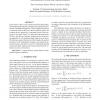Free Online Productivity Tools
i2Speak
i2Symbol
i2OCR
iTex2Img
iWeb2Print
iWeb2Shot
i2Type
iPdf2Split
iPdf2Merge
i2Bopomofo
i2Arabic
i2Style
i2Image
i2PDF
iLatex2Rtf
Sci2ools
ICASSP
2009
IEEE
2009
IEEE
Multi-microphone maximum a posteriori fundamental frequency estimation in the cepstral domain
In this work we derive a new cepstrum based maximum likelihood fundamental frequency estimator that exploits the information of multiple microphones. The new approach results in a maximum search on the sum of the microphone cepstra. We compare the new approach to a maximum search on the cepstrum of the output signal of a delay-and-sum beamformer. We show that the new approach outperforms the beamforming approach for all considered input signal-to-noise ratios. We develop a general framework which includes the cepstral harmonics of the fundamental frequency and extend the approach towards a maximum a posteriori fundamental period tracker that further enhances the results and increases the robustness in noisy environments.
Fundamental Frequency | ICASSP 2009 | Likelihood Fundamental Frequency | Maximum Search | Signal Processing |
| Added | 17 Aug 2010 |
| Updated | 17 Aug 2010 |
| Type | Conference |
| Year | 2009 |
| Where | ICASSP |
| Authors | Timo Gerkmann, Rainer Martin, Derya Dalga |
Comments (0)

